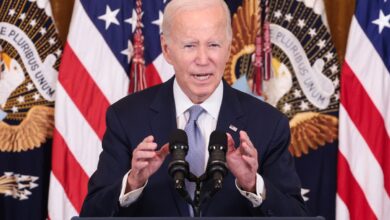Ukraine crisis: What are the Donetsk and Luhansk People’s Republics?

After weeks of rising tensions between Russia and Ukraine over Moscow’s build-up of military forces along its western border with its neighbour, war has finally returned to Europe.
Russian president Vladimir Putin announced a “special military operation” in a televised address to his citizens in the early hours of Thursday morning, drawing a line under the West’s diplomatic efforts to avert calamity and restore the peace.
Explosions were reported soon afterwards on the outskirts of the cities of Kharkiv, Kramatorsk, Mariupol, as well as the capital Kyiv, prompting many Ukrainians to form queues at supermarkets, ATMs and petrol stations in preparation for weathering the siege or attempting to flee.
Ukrainian president Volodymyr Zelensky said his government has introduced martial law in all territories of the state and urged citizens to stay at home as much as possible.
Meanwhile the country’s airports have been shut down temporarily and secured against potential Russian aircraft landings while Russia has closed its own airspace around the border to civilian access for the next four months.
In the opening skirmishes, Ukraine’s military has said it has destroyed four Russian tanks on a road near the eastern city of Kharkiv, killed 50 troops near a town in Luhansk region and downed a sixth Russian aircraft, also in the country’s east.
According to Mr Zelensky, 137 Ukrainian civilians and soldiers were ultimately killed on the first day of fighting and another 316 injured as he appealed to the international community to do more to help. He pledged to remain in Kyiv as Russian missile strikes began to target the city in the early hours of Friday morning.
Tensions in Eastern Europe have rumbled on since December when Russia stationed an estimated 130,000 soldiers along its western border and then another 30,000 in Belarus, consistently denying it had any attention of making incursions into Ukraine.
Frantic diplomatic negotiations were pursued by the likes of US secretary of state Antony Blinken, French president Emmanuel Macron, German chancellor Olaf Scholz and UK foreign secretary Liz Truss in the hoping of averting calamity but ultimately appear to have come to nothing.
Then the situation escalated drastically on Monday when Mr Putin formally recognised two eastern Ukrainian regions held by pro-Russian separatist groups as independent states.
Denis Pushilin and Leonid Pasechnik, leaders of the self-proclaimed Donetsk People’s Republic (DPR) and Luhansk People’s Republic (LPR) respectively, made a direct appeal to the Kremlin and asked for military and financial aid as the situation in those regions became increasingly critical.
The Russian leader duly informed his security council that it was necessary that their appeals be considered seriously.
Mr Putin was told by his predecessor, Dmitry Medvedev, now deputy chairman of the council, that he believes a majority of Russians would support the two regions’ independence claims, adding that around 800,000 Russian citizens live in the DPR and LPR.
Recognition of their status as independent states swiftly followed, giving Mr Putin a pretext to send troops across the border while arguing that he was doing so to protect the breakaway regions as fellow allies against Kyiv.
The international community immediately hit out at the decision, with the United Nations Security Council expressing “great concern”.
Vassily Nebenzia, the Russian ambassador to the UN, insisted there would be no “new bloodbath” in eastern Ukraine but warned the West to “think twice” before making matters worse.
US president Joe Biden, UK prime minister Boris Johnson and UN secretary general Antonio Guterres have since joined other global powers in condemning Moscow’s “unprovoked and unjustified” attack of Thursday morning and promised to hold it “accountable”.
The sanctions so far unveiled by the West, including steps taken to hinder Russian banks and wealthy plutocrats from doing business abroad and the blocking of regulatory approval for the lucrative Nord Stream 2 natural gas pipeline, have been criticised as inadequate and senior Russia officials like Mr Medvedev and Sergey Lavrov have shrugged them off with a smirk.
Mr Lavrov was particularly dimissive, declaring: “Our European, American, British colleagues will not stop and will not calm down until they have exhausted all their possibilities for the so-called ‘punishment of Russia’. They are already threatening us with all manner of sanctions or, as they say now, ‘the mother of all sanctions’.
This map shows major cities in Ukraine as well as Moscow-backed separatist regions. As of early this week, rebels held only parts of the Donetsk and Luhansk regions highlighted





